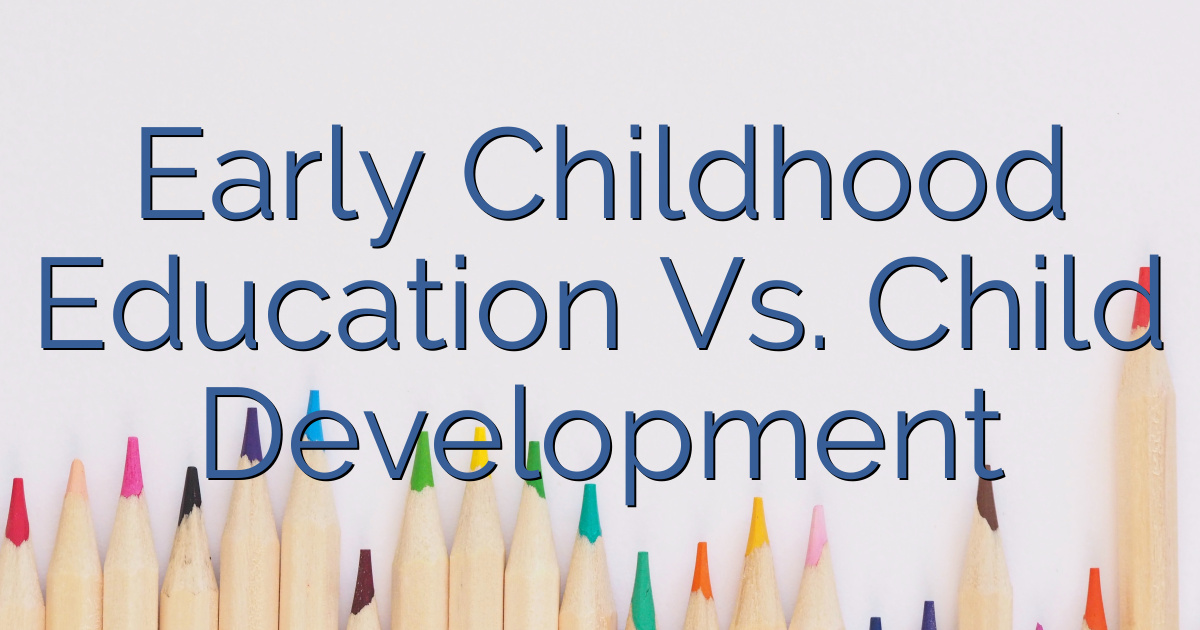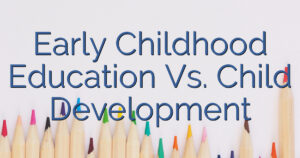 Are you torn between the fields of Early Childhood Education and Child Development?
It’s a tough decision, but fear not! This article will provide you with a comprehensive comparison of the two majors, helping you make an informed choice.
We’ll explore the curriculum, pedagogy, cognitive skills developed, career opportunities, and salary potential in both fields.
By the end, you’ll have a clear understanding of the similarities, differences, and factors to consider when choosing between Early Childhood Education and Child Development.
Let’s dive in!
Are you torn between the fields of Early Childhood Education and Child Development?
It’s a tough decision, but fear not! This article will provide you with a comprehensive comparison of the two majors, helping you make an informed choice.
We’ll explore the curriculum, pedagogy, cognitive skills developed, career opportunities, and salary potential in both fields.
By the end, you’ll have a clear understanding of the similarities, differences, and factors to consider when choosing between Early Childhood Education and Child Development.
Let’s dive in!
Table of Contents
Key Takeaways – Early Childhood Education Vs. Child Development
- Early childhood education focuses on the connection between child development and educational practices.
- Both early childhood education and child development provide a foundation for lifelong learning and development.
- Early childhood education curriculum fosters holistic development, while child development curriculum focuses on understanding stages of development.
- Early childhood education careers primarily involve teaching children aged 3 to 5, while child development careers can be in hospitals, research institutions, or social service agencies.
Overview of Early Childhood Education and Child Development
In early childhood education, you’ll learn about the important connection between child development and educational practices. Early childhood education refers to the educational programs and strategies aimed at children from birth to around eight years old. It recognizes that a child’s early years are critical for their overall development and future success. Child development, on the other hand, refers to the biological, psychological, and emotional changes that occur as children grow. It encompasses physical, cognitive, language, and social-emotional development. Early childhood education plays a vital role in supporting and enhancing child development. It provides opportunities for children to engage in play-based activities, which are essential for their holistic development. Play promotes cognitive skills, social interaction, imagination, and problem-solving abilities. Through early childhood education, children are given a solid foundation for lifelong learning and development.Overview of the curriculum and pedagogy of the two majors
Take a look at the curriculum and teaching methods for both majors in early childhood education and child development. In early childhood education, the curriculum design focuses on fostering the holistic development of young children. It includes areas such as language and literacy development, cognitive skills, social-emotional development, and physical development. Teaching strategies in this major often involve hands-on activities, play-based learning, and individualized instruction to meet the unique needs of each child. On the other hand, child development majors focus on understanding the various stages of child development from infancy to adolescence. The curriculum emphasizes theories of child development, observation skills, and assessment techniques. Teaching strategies in this field often involve creating a supportive and nurturing environment, promoting positive relationships, and implementing developmentally appropriate activities. Both majors share the goal of providing quality education and promoting the well-being of children, but the curriculum and teaching strategies differ to meet the specific objectives of each field.Overview of coursework, assessments, and learning outcomes
Explore the coursework, assessments, and learning outcomes to gain a comprehensive understanding of the two majors. In early childhood education, the coursework requirements focus on foundational knowledge in child development, curriculum planning, and instructional strategies specific to young children. Assessment methods in this major include observations, portfolios, and standardized tests to evaluate children’s learning progress. The learning outcomes for early childhood education majors include the ability to design developmentally appropriate curriculum, create inclusive learning environments, and effectively communicate with children and their families. In child development, the coursework requirements delve deeper into the study of child psychology, social and emotional development, and research methods. Assessment methods in this major often involve conducting research experiments, analyzing data, and writing research papers. The learning outcomes for child development majors include the ability to critically analyze theories of child development, apply research findings to practical settings, and advocate for children’s rights and well-being. To further illustrate the differences between the two majors, here is a table highlighting some key coursework requirements and assessment methods:| Coursework Requirements | Early Childhood Education | Child Development |
|---|---|---|
| Child Development Theories | ✔️ | ✔️ |
| Curriculum Planning | ✔️ | ❌ |
| Research Methods | ❌ | ✔️ |
| Social and Emotional Development | ✔️ | ✔️ |
| Observations and Portfolios | ✔️ | ❌ |
| Research Experiments | ❌ | ✔️ |
Comparison of Cognitive Skills Developed
The coursework and assessments in each major develop different cognitive skills. In early childhood education, the focus is on fostering cognitive development through play-based activities and hands-on learning experiences. Children are encouraged to explore, problem-solve, and think critically, which are essential skills for future academic success. Research shows that cognitive development theories, such as Piaget’s stages of development and Vygotsky’s sociocultural theory, have a significant impact on children’s learning and overall cognitive abilities.Comparison of Career Opportunities and Job Roles in Early Childhood Education Vs. Child Development: Teaching
Career opportunities and job roles in teaching young children differ between early childhood education and child development. In early childhood education, you will primarily work in schools or daycare centers, teaching children aged 3 to 5 years old. Your role will involve creating lesson plans, implementing teaching methods that promote cognitive and social development, and assessing children’s progress. This field offers a variety of career growth opportunities, such as becoming a lead teacher, program director, or even opening your own early childhood center. On the other hand, in child development, you may work in various settings like hospitals, research institutions, or social service agencies. Your focus will be on understanding and supporting children’s overall development, including physical, emotional, and cognitive aspects. Career growth in child development may include positions like child life specialist, developmental psychologist, or program evaluator. Both fields provide rewarding opportunities to positively impact young children’s lives and contribute to their growth and development.Comparison of Salary Potential: Job Market Trends
Now that you’ve learned about the different job roles in early childhood education and child development, let’s discuss salary potential and job market trends. It’s crucial for early childhood educators and child development professionals to consider their earning potential and the demand for their skills in the job market. When it comes to salary potential, both early childhood education and child development offer promising opportunities. However, it’s important to note that factors such as experience, education level, and location can significantly impact earning potential in both fields. In terms of job market trends, the demand for qualified early childhood educators and child development professionals is expected to continue growing. This is due to an increased emphasis on early childhood education and the understanding of its long-term benefits. As a result, job satisfaction and professional growth opportunities are also on the rise in both fields. Overall, both early childhood education and child development offer rewarding career paths with the potential for job satisfaction and professional growth. When deciding which path to pursue, it’s important to consider your individual interests, skills, and goals.Similarities between Early Childhood Education and Child Development Programs
Both fields offer similar opportunities for professional growth and job satisfaction. In terms of similarities, both early childhood education and child development programs focus on the well-being and development of young children. They both emphasize the importance of creating a safe and nurturing environment for children to learn and grow. Additionally, both fields recognize the significance of building strong relationships with children and their families to support their overall development. On the other hand, there are also differences between the two. Early childhood education programs typically focus on teaching and curriculum development, while child development programs have a broader scope and cover various aspects of child development, including physical, cognitive, and socio-emotional development. Despite these differences, both fields share the common goal of positively impacting the lives of children and laying the foundation for their future success.- Similarities:
- Focus on well-being and development of young children
- Emphasis on creating a safe and nurturing environment
- Differences:
- Early childhood education focuses on teaching and curriculum development
- Child development programs have a broader scope covering various aspects of development
Difference between Early Childhood Education and Child Development Majors
If you’re deciding between majors, one key distinction to consider is the focus of each program. Early Childhood Education majors primarily focus on the teaching and instruction of young children, typically from birth to around age eight. These majors prepare you for a career in teaching, whether it be in a preschool, kindergarten, or primary school setting. On the other hand, Child Development majors have a broader focus that encompasses the overall growth and development of children from birth through adolescence. While this major also prepares you for careers in education, it also opens up opportunities in fields such as psychology, social work, and counseling.Factors to consider when choosing between the two majors: Interests
When deciding between the two majors, it’s important to consider your interests. Exploring your passions is a crucial part of choosing a career path. Think about what subjects or activities excite you the most. Are you drawn to teaching and guiding young children? Or are you more interested in studying their development and understanding how they learn? By considering your personal strengths, you can align them with the demands of each major. For example, if you have excellent communication skills and enjoy working with others, a major in early childhood education may be a good fit. On the other hand, if you have a strong analytical mind and enjoy observing and analyzing behaviors, child development may be the better choice.What is the difference between early childhood education and child development?
Early childhood development education focuses on preparing young children for formal schooling by providing a structured environment and academic instruction. Child development, on the other hand, encompasses the overall growth and maturation of a child, including physical, cognitive, and socio-emotional development.

